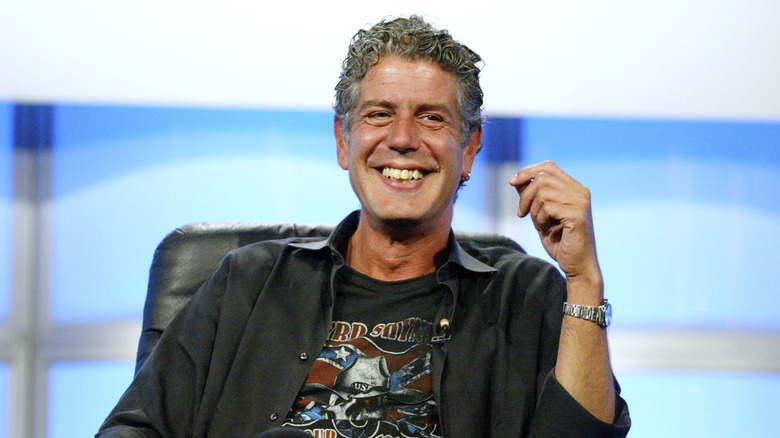
Frederick M. Brown/Getty Images
We may receive a commission on purchases made from links.
Anthony Bourdain didn't just cook food, he exposed the truth behind it. In his groundbreaking 2000 book, "Kitchen Confidential: Adventures in the Culinary Underbelly," the late chef and travel documentarian offered a raw look at what really goes on behind the scenes in restaurant kitchens. While most of the book is a celebration of cooking and the people who do it, some of its most memorable moments are the warnings. Bourdain offers the kinds of insider tips you only get from someone who's worked the line, scrubbed the walk-in, and seen what happens when the dinner rush ends.
Some of his advice has become legendary, repeated in food blogs and TV recaps for decades. Other warnings have aged or evolved as restaurant practices have improved. But all of them reflect a core philosophy: eat boldly, but eat smart. This article explores the most iconic of Bourdain's "do not order" recommendations, unpacking the reasons behind them and whether they still hold up today. If you've ever wondered what chefs really think of your brunch order, you're in the right place.
Discount sushi
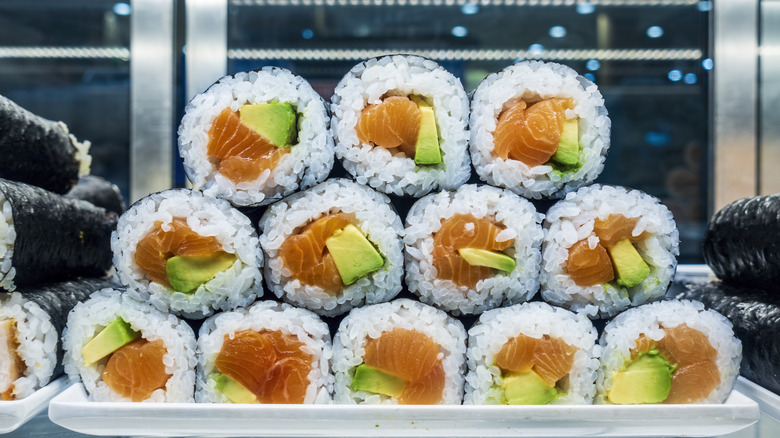
Sfe-co2/Getty Images
Anthony Bourdain had strong opinions about food safety, and few things raised his alarm like discount sushi. In "Kitchen Confidential," he described it as a prime example of what not to eat if you care about quality or your stomach. "I saw a sign the other day outside one of those Chinese-Japanese hybrids that are beginning to pop up around town, advertising 'Discount Sushi,'" he wrote. "I can't imagine a better example of things to be wary of in the food department than bargain sushi."
Bourdain explained that the freshest, highest-quality fish is purchased first, usually early in the morning, by chefs with long-standing relationships with suppliers. By the time the market is nearly closed, the only seafood left is what no one else wanted. "At 7 a.m., the Korean and Chinese buyers, who've been sitting in local bars waiting for the market to be near closing, swoop down on the over-extended fishmonger and buy up what's left at rock-bottom prices," he wrote. "The next folks to arrive will be the cat-food people." That's the fish that ends up in your discounted spicy tuna roll.
Fish on Mondays
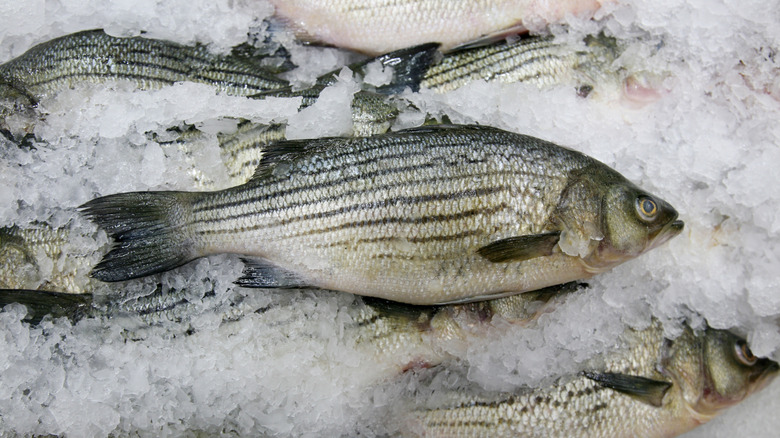
mikeledray/Shutterstock
Perhaps one of Anthony Bourdain's most famous, and widely repeated, pieces of restaurant advice was simple: never order fish on a Monday. In "Kitchen Confidential" and his 1999 New Yorker article, "Don't Eat Before Reading This," Bourdain pulled back the curtain on restaurant supply chains and exposed how the timing of seafood deliveries could leave Monday diners unknowingly eating days-old fish.
According to Bourdain, most chefs place their seafood orders on Thursday for a busy weekend service. Fish typically arrives Friday morning, gets served the same day and Saturday, and is stretched through Sunday. By Monday, what's left is whatever didn't sell, which can be four or five days old, depending on how it was stored. Specials on a Monday, especially seafood dishes like vinaigrettes or frittatas, were often red flags.
Over time, however, Bourdain acknowledged that this rule had become outdated. As discussed in a reflection on what still holds true from "Kitchen Confidential," modern supply chains and the rise of daily deliveries in many cities have made Monday fish somewhat safer. Still, when in doubt, skip the seafood until Tuesday.
Mussels
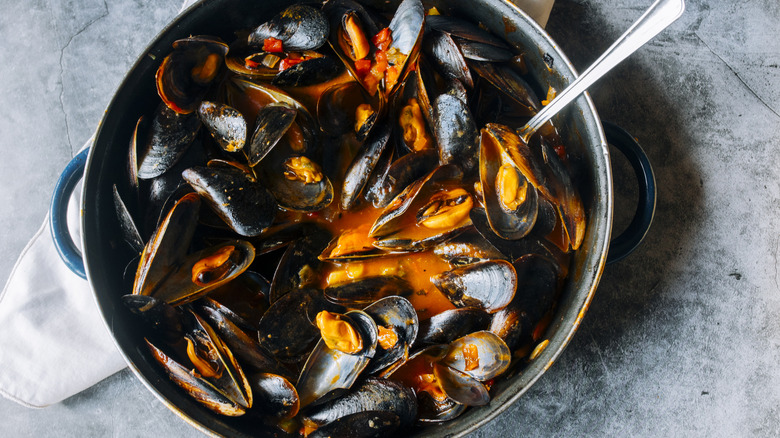
Nitas/Getty Images
Anthony Bourdain loved mussels, but he rarely ordered them at restaurants and he strongly advised others to think twice before doing so. Unless he personally knew the chef or had seen how the mussels were stored, he wouldn't touch them.
In theory, mussels are simple. They cook quickly and plate easily, making them a favorite among line cooks. But that ease is exactly why Bourdain was skeptical. In his words, mussels are "too easy," which means they can be rushed out without much inspection. According to Bourdain, many kitchens don't store them properly. Instead of being kept in well-drained containers and inspected for freshness, mussels are often left to sit in their own murky liquid at the bottom of a reach-in cooler.
At a reputable Paris brasserie, Bourdain once ate a single bad mussel hidden among an otherwise immaculate bowl. That night, he experienced stomach cramps, vomiting, and hours of regret. He described it as the kind of illness that briefly made even him, a proud atheist, pray. "I do not care to repeat that experience. No thank you on the mussels. If I'm hungry for mussels, I'll pick the good-looking ones out of your order," he wrote in "Kitchen Confidential."
Brunch
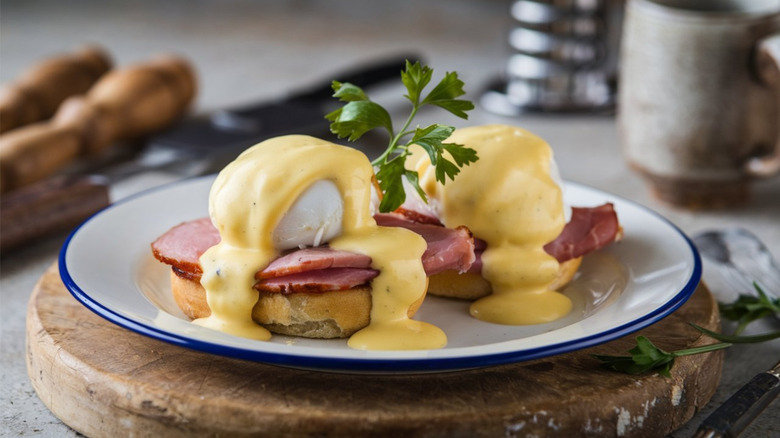
Food Arena/Shutterstock
Anthony Bourdain's disdain for brunch was no secret, and it had little to do with taste. For him, brunch was a behind-the-scenes nightmare for both chefs and diners. He described it as a marketing gimmick and a way to offload leftovers while charging premium prices.
Brunch menus, Bourdain wrote, are "a dumping ground for the odd bits left over from Friday and Saturday nights." Leftover fish or meat is often disguised with sauces, vinaigrettes, or herbs to mask its age. He was particularly wary of hollandaise sauce, a brunch staple he called "a veritable petri dish of biohazards." The sauce must be kept at a lukewarm temperature that is ideal for bacteria to grow, and in most kitchens, it is not made to order. "Most likely, the stuff on your eggs was made hours ago," Bourdain warned.
The problem wasn't just the food. Brunch service tends to be staffed by the least experienced cooks. The top line cooks are usually working the busy Friday and Saturday night shifts, while the Sunday morning crew, as Bourdain put it, is the "B-Team." With head chefs often off on Sundays, there is minimal supervision in the kitchen.
Swordfish
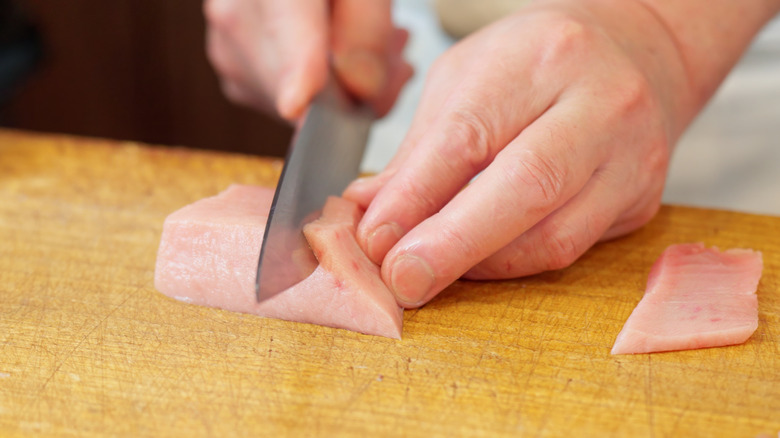
mapo_japan/Shutterstock
Regardless of the day, Bourdain never ordered swordfish. In "Kitchen Confidential," he shared the kind of insider tip that might ruin your appetite for it, too. "My seafood purveyor, when he goes out to dinner, won't eat it," Bourdain wrote regarding ordering swordfish. "He's seen too many of those 3-foot-long parasitic worms that riddle the fish's flesh."
In a 2010 study, researchers found parasites in 99% of 157 Atlantic swordfish samples. These included 18 types of parasites, such as Anisakis nematodes, which can burrow deep into the muscle. If eaten raw or undercooked, they can invade the human gastrointestinal tract, causing pain, allergic reactions, or even migrating into the throat or nasal passages. While freezing at −4 degrees Fahrenheit for at least seven days or cooking to an internal temperature of about 145 degrees Fahrenheit kills these parasites, simple filleting doesn't guarantee their removal.
Parasitic worms aren't the only concern. As a large predatory fish, swordfish also accumulate high levels of mercury, a toxic heavy metal that can pose serious health risks, especially for pregnant women and young children. Long-term exposure to mercury has been linked to neurological damage, cardiovascular disease, and other chronic conditions.
Well-done steak
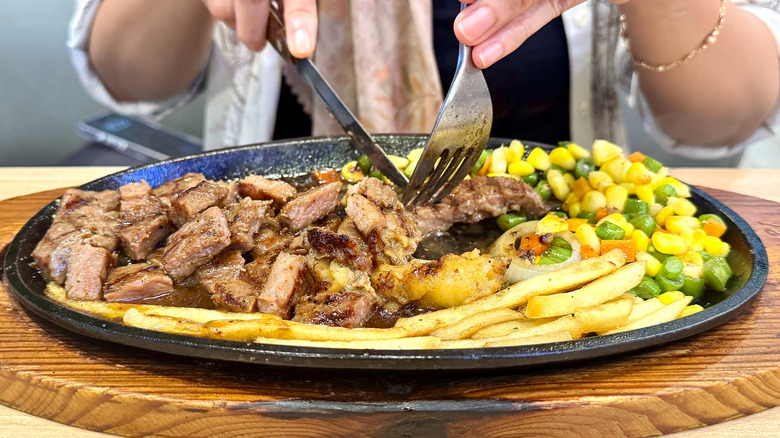
khiara aqila arisanti/Shutterstock
Anthony Bourdain had little patience for overcooked meat, and even less for those who ordered it that way. To him, a well-done steak was a gift to the kitchen. Many chefs see it as an opportunity to offload cuts riddled with nerve tissue, excess fat, or that are starting to spoil. You are not getting the best the kitchen has to offer, you are getting whatever they need to get rid of. That tough, flavorless steak on your plate is likely the worst cut in the kitchen.
In "Don't Eat Before Reading This," Bourdain called these diners "philistines" who "pay for the privilege of eating our garbage." According to him, ordering a steak well-done means you're likely to be served a dry, tough end-cut that's been lingering in the back of the fridge. This tradition of "saving for well-done," as he put it, is rooted in economics. Every cut of meat should ideally return three to four times its cost, and using a subpar piece on a customer who won't notice the difference is simply good business.
Truffle oil
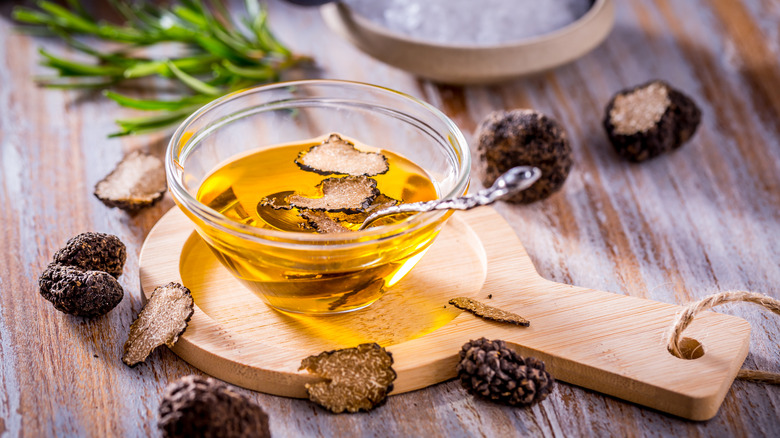
Brebca/Getty Images
In a 2017 YouTube video posted on "The Tonight Show Starring Jimmy Fallon" account, Anthony Bourdain shared his honest opinions on popular food trends. When it came to truffle oil, Bourdain claimed it was a "horrible" ingredient that's "about as edible as Astroglide and made from the same stuff." Others agree with Bourdain, including celebrity chef Gordon Ramsay, who believes that truffle oil is "the worst thing," and Michelin-star chef Alton Brown, who tweeted, "Culinary truth: truffle oil sucks."
Truffle oil has become a trendy ingredient to spruce up pastas, risottos, pizzas, and french fries. As an expensive and rare delicacy, truffles themselves often come with an expensive price tag. Truffle oil, on the other hand, is more affordable and accessible, yet a common misconception is that it tastes just like truffles. Many chefs believe the oil lacks the unique earthy flavor profile of the fungi it's meant to be derived from. This is most likely due to the fact that most truffle oils don't actually contain truffles. Although traditional truffle oil is made with high-quality olive oil infused with truffles, the majority of the truffle oils on the market are produced with 2,4-dithiapentane, a synthetically-produced ingredient to give the oil the distinct truffle aroma.
Kobe sliders
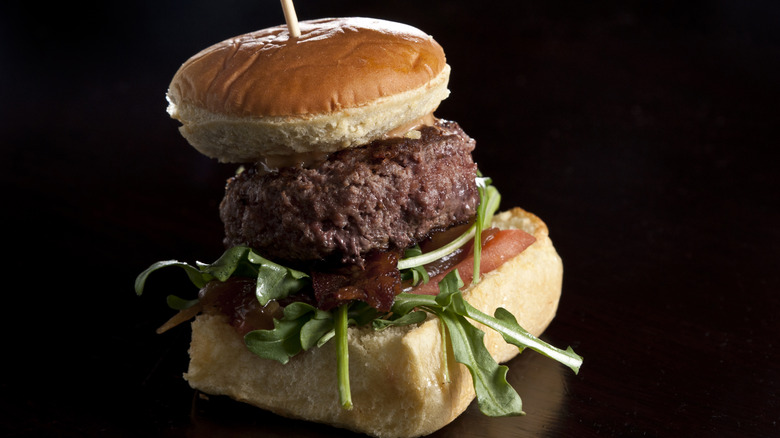
Juanmonino/Getty Images
Anthony Bourdain consistently criticized the Kobe beef sliders. "There is no food crime worse," the celebrity chef declared in the Jimmy Fallon YouTube video. He said that spotting the mini burgers on a menu was reason enough to leave a restaurant. In his words, it meant you'd likely be surrounded by "high-fiving hedge funders," and the experience probably wouldn't be worth your time.
His issue wasn't just with sliders themselves. It was the marketing behind them that he couldn't stand. Restaurants slapped the word "Kobe" on anything to make it sound exclusive or luxurious, even if the claim was misleading. In reality, authentic Kobe beef, produced in Japan's Hyogo Prefecture, is extremely rare and expensive, and very little of it is ever exported to the United States. Most so-called "Kobe" beef served in American restaurants is domestic beef, not the Japanese delicacy.
Gimmicky menu items

Okrasiuk/Shutterstock
Nine years ago, Anthony Bourdain took to Reddit with a post titled, "I am Anthony Bourdain and I'm really good at finding cool s***. AMA." During the session, a user asked which food trend he most wanted to see disappear. In classic Bourdain fashion, his response was blunt and unapologetic: "I would like to see the pumpkin spice craze drowned in its own blood. Quickly."
His disdain for the autumnal trend was sharp, but not entirely surprising. Bourdain was known for rejecting culinary gimmicks and favoring authenticity over hype. During the 2009 New York Wine & Food Festival, he said cheeseburgers on a Krispy Kreme doughnut were "a war crime." Similarly, in an interview with Town & Country, Bourdain aired his grievances about the short-lived Starbucks unicorn Frappuccino. "Wow, that's like four things I hate all in one sentence: Starbucks, unicorns, and the colors pink and purple. Also a Frappuccino! It's the perfect nexus of awfulness," he said.
Ground beef
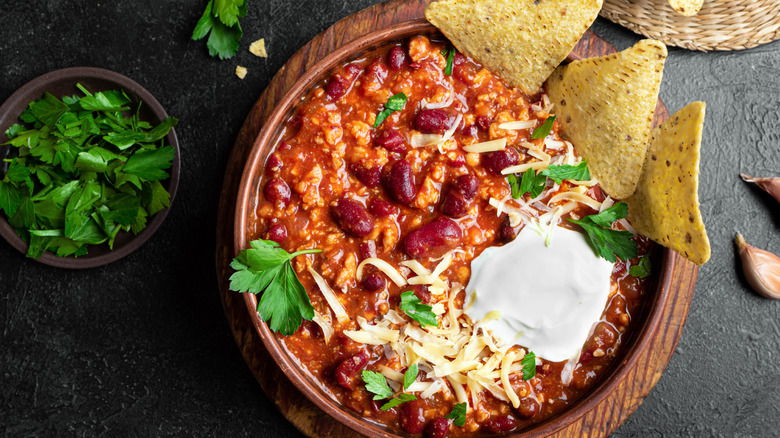
Oksana Mizina/Shutterstock
Anthony Bourdain frequently encouraged restaurant-goers to be intentional and discerning when ordering, especially in establishments with higher price points. His advice was simple: opt for dishes featuring the freshest, highest-quality ingredients. As a result, he often advised against ordering ground beef, especially when it appeared in entrees where sauces or seasonings could mask poor-quality meat.
Although one of Bourdain's favorite guilty pleasures was a burger from the California chain, In-N-Out, he remained wary of ground beef offerings at most sit-down restaurants. In his book "Kitchen Confidential," Bourdain wrote, "Beef Parmentier? Shepherd's pie? Chili special? Sounds like leftovers to me." These dishes, often featured in a casserole or stew-like form, can easily conceal the age or quality of the meat beneath layers of sauce, potatoes, or spices. Additionally, ground beef can present real health concerns. It's often a blend of trimmings and scraps from multiple cuts, which can increase the risk of bacterial contamination like E. coli. Unless freshly ground and properly handled, the meat can lose its natural flavor, turning greasy or bland once cooked.



